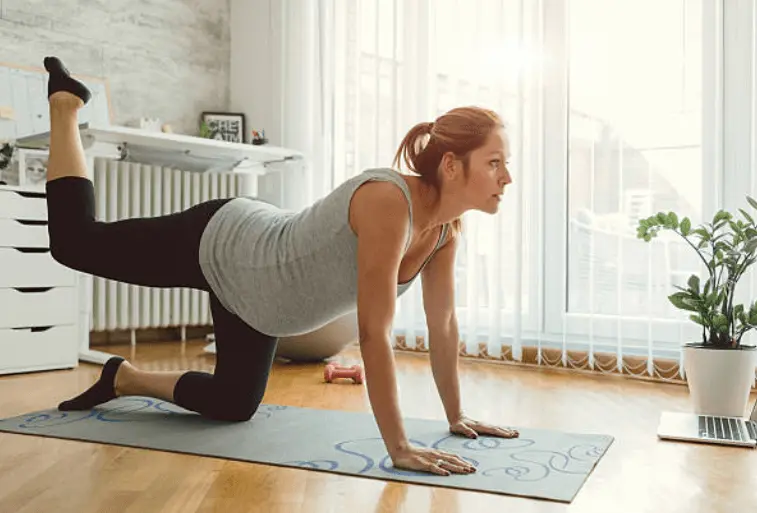When considering how to exercise during pregnancy, many questions usually arise. Exercise is a bodily activity that improves or maintains physical fitness as well as overall health and wellness. The type of exercise is important during pregnancy because it can help with some common pregnancy discomforts and even prepare your body for labor and delivery.
Is it safe to exercise during pregnancy?
Consult with your doctor or consultant about exercising while you are pregnant. Exercising is safe and healthy for most pregnant women and their babies.
Exercise will not increase your chances of having a miscarriage, a premature baby, or a baby born with low birth weight.
How much exercise do you require during pregnancy?
Every week, healthy pregnant women should engage in some moderate-intensity aerobic activity. Aerobic activities cause you to breathe more quickly and deeply, as well as cause your heart to beat faster.

Moderate-intensity means you’re working out hard enough to sweat and raise your heart rate. Walking is an example of moderate-intensity aerobic activity.
Why is physical activity beneficial during pregnancy?
Regular exercise can help healthy pregnant women:
- Maintain your mental and physical health. Physical activity can improve your mood and increase your energy. Additionally, it strengthens the heart, lungs, and blood vessels and maintains fitness.
- Assist yourself in achieving a healthy weight gain during pregnancy.
- Reduce some of the most common pregnancy discomforts, including constipation, back pain, and leg, ankle, and foot swelling.
- Assist yourself in managing stress and sleeping better. Stress is defined as worry, strain, or pressure that you experience in response to events in your life.
- Reduce your chances of pregnancy complications like gestational diabetes and preeclampsia.
- Reduce your chances of having a cesarean birth (c-section).
- Yoga and Pilates can help you practice breathing, meditation, and other calming techniques that may help you manage labor pain.
What activities are safe to do while pregnant?
If you were healthy and worked out regularly before you got pregnant, it is usually safe to keep doing what you were doing. But as your pregnancy goes on, you may need to change the things you do or do less of them. Consult your doctor and your gym trainer.

Most of the time, it’s safe to do these things while pregnant:
- Walking. A fast walk is a great way to get in shape and is easy on your muscles and joints. This is a great activity for people who have never worked out before.
- Yoga and Pilates classes. Inform your instructor of yoga or Pilates that you are pregnant. The instructor can help you modify or avoid potentially dangerous poses for pregnant women, such as lying on your stomach or flat back.
- Low-impact aerobics classes. Low-impact aerobic exercises include walking, cycling on a stationary bike, and using an elliptical machine. Low-impact aerobics is less physically demanding than high-impact aerobics.
Home exercise options include walking in a secure area or watching exercise videos. Find ways to stay active every day, like doing yard work or taking the stairs instead of the elevator.
Is exercise safe for all pregnant women?
The following conditions may make exercise unsafe during pregnancy:
- Premature labor or breakage of uterus membrane.
Consult with your doctor or consultant if you are having premature labor while exercising. - Pregnant with twins, triplets, and other risk factors for preterm labor. Ask your consultant if it’s safe for you to exercise while pregnant with multiples. Your provider may instruct you not to engage in strenuous or high-impact activities such as running.
- Preeclampsia or gestational hypertension. High blood pressure during pregnancy is known as gestational hypertension. It appears after 20 weeks of pregnancy and disappears after birth. After 26 weeks of pregnancy, there is a previa of the placenta. This occurs when the placenta is very low in the uterus and covers the entire or a portion of the cervix. The placenta develops in your uterus and provides food and oxygen to the baby via the umbilical cord. Previa placenta can result in heavy bleeding and other complications later in pregnancy.
- Severe anemia, as well as certain heart and lung conditions. Anemia occurs when your body does not have enough healthy red blood cells to transport oxygen throughout your body. Ask your doctor if you can exercise while pregnant if you have a heart or lung condition.

What activities should you avoid while pregnant?
When selecting your activities, be cautious and consult with your doctor.
Avoid doing the following during pregnancy:
- Horseback riding, downhill skiing, off-road cycling, gymnastics, and skating are all examples of activities with a lot of jerks and bouncing movements that can cause you to fall.
- Any sport where you could get hit in the stomach, such as ice hockey, boxing, soccer, or basketball.
- Any exercise that requires you to lie flat on your back, such as sit-ups. When you lie on your back, your uterus presses against a large vein that returns blood to your heart; lying on your back can lower your blood pressure and restrict blood flow to your baby.
- Water sports such as water skiing, surfing, and diving can cause you to hit the water with great force.
- Scuba diving or skydiving. Decompression sickness can occur as a result of scuba diving. This is the point at which dangerous gas bubbles form in your baby’s body.
- Exercising at a high altitude is not recommended unless you live at a high altitude. Exercising at high altitudes while pregnant can reduce the amount of oxygen reaching your baby.
- Activities that may cause your body temperature to rise too quickly or exercising outside on hot, humid days. It is not safe for pregnant women because it can cause hyperthermia, a condition in which your body temperature rises above normal. According to some studies, spending too much time in a sauna or hot tub may raise your body temperature and increase your chances of having a baby with birth defects. To be safe, don’t spend more than 15 minutes in a sauna or more than 10 minutes in a hot tub at a time.
Does pregnancy alter your body’s response to exercise?
Your body changes dramatically during pregnancy. The changes are
- Balance. During pregnancy, you may notice that you lose your balance more easily.
- Breathing. More oxygen is required as your baby grows and your body changes. Your expanding belly puts strain on your diaphragm, a muscle that allows you to breathe. You may even experience shortness of breath at times.
- Energy. Because your body is working hard to care for your baby, you may have less energy during pregnancy.
- Heart rate. During pregnancy, your heart works harder and faster to deliver oxygen to your baby.
When should you stop working out? What are the warning signs to look for when exercising?
Drink plenty of water while exercising, and pay attention to your body and how you feel.
If you notice any of the following signs or symptoms, discontinue your activity and contact your doctor:
- Chest pain, rapid heartbeat, or difficulty in breathing
- Dizziness or fainting
- Muscle weakness, difficulty in walking, or lower leg pain or swelling
- Constant, painful contractions.
Also, you should not work out during the final stages of pregnancy. Consult your doctor or health consultant for better help.
When can you resume exercising after giving birth?
Consult your doctor or consultant to determine when you can resume normal activity. If you have a vaginal birth with no complications, you can usually begin exercising a few days after giving birth or as soon as you’re ready. The uterus contracts during vaginal birth to assist in pushing your baby out of the vagina (birth canal).
You may need to wait longer to begin exercising after birth if you had a c-section or if there were complications during birth. Your consultant can advise you on when your body is ready to exercise.
If you were physically active during your pregnancy, it would be easier to get back into shape after your baby is born. Simply begin slowly. If you experience pain or other problems while exercising, stop and consult with your provider.
In Conclusion
Physical activity is beneficial to both mom and baby during pregnancy.
Including some form of exercise on most days of the week can help keep your core strong, muscles fit, and your cardiovascular system in peak condition. It can also improve your mental health.
Listen to your body and stop if you experience any discomfort or pain. As always, if you have any questions or concerns about how your body is responding to an exercise program, consult your doctor.
